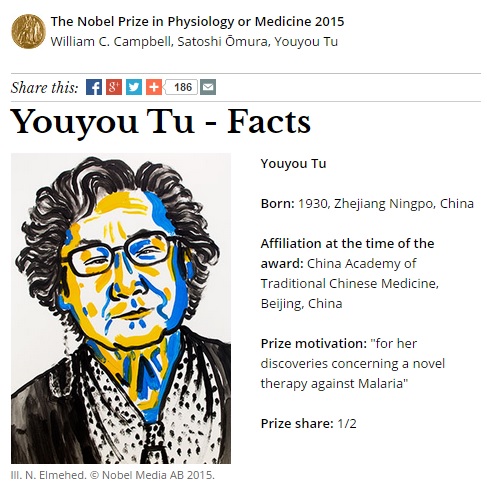Boston, Oct. 5, 2015, — Less than a week after receiving the Warren Alpert Award from Harvard Medical School, Chinese scientist Tu Youyou is selected as one of the three winners of this year’s Nobel Prize in Physiology or Medicine. The other two scientists sharing this award are: William C. Campbell of Ireland and Satoshi Omura of Japan.

The picture of Tu Youyou was featured on nobelprize.org in the announcement today.
“#NobelFacts Chinese Youyou Tu is the 12th women awarded the #NobelPrize in Physiology or Medicine,” the Nobel Prize twitter account wrote earlier today.
Tu is a heavily honored scientist who has led several teams in studying atreannuins. In 1992, her by-hydrogen atreannuin project was listed by the State Science Commission as one of the ten science and technology achievements. A similar project in 1997 was rated by the Ministry of Public Health as one of the ten great public health achievements.
The winner of the Albert Einstein World Science Prize from the World Culture Council, Tu is the chief research fellow of the Institute of Chinese Traditional Medicines at the Chinese Academy of Traditional Chinese Medicine. At the academy, she has taught many doctoral students.
Tu was born in Ningbo, a city on the east coast of China, at the end of 1930. Her father was a staff member in an organization, while her mother stayed home to tend to Tu and her four brothers. She received four years of training at the School of Pharmacy, Beijing Medical College, between 1951 and 1955. In those days, most graduates with superior academic credentials like Tu were assigned to work in the research institutes due to the huge demand for medical research professionals in China. “I was chosen to work in the Institute of Materia Medica, Academy of Traditional Chinese Medicine, and have worked at the institute for over 55 years since then,” Tu told the JCI. Her responsibility within the organization evolved from bench scientist to associate professor, professor, and then department head. “Both of my parents received a good education, and I always feel lucky and thankful to my parents for their dedicated support for me to complete my education. My father has some knowledge in traditional Chinese medicine, and he gave me plenty of backup when I selected medicine as my career,” Tu noted.
Tu’s interests in traditional Chinese medicines were partially stimulated by the environment in which she grew up: “In my childhood, a lot of folk recipes were used for the treatment or relief of some disease symptoms, and some of them were quite effective.” She went on to note, “However, my primary influence was probably from Professor Lin Qi Shou, one of the most respected phytochemists in China, whom I met at the university. He passed his knowledge and in particular his diligence in herb research to the young generation. It was then my interests turned into motivation.”
After joining the Institute of Materia Medica, Tu attended a 2.5-year full-time training course on the use of traditional Chinese medicines. She noted, “This systemic training really equipped me with a unique, integrated, and philosophic knowledge encapsulating the modern pharmaceutical sciences and traditional Chinese medicine.” At the institute, the primary goals were to search for medications to treat various diseases, in particular those that remained uncured by Western medicines. Communist China was at the height of the Cultural Revolution (1966–1976), a period that was marked by chaos and in which scientific research had all but stagnated. The institute where Tu was working employed not only traditional Chinese practitioners and historians, but also chemists, pharmacologists, and other medical doctors. Tu’s workplace was a unique setup specific to institutions in China where scientists worked side by side with historians.